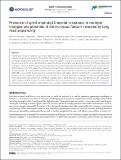Presence of optrA-mediated linezolid resistance in multiple lineages and plasmids of Enterococcus faecalis revealed by long read sequencing
Abstract
Transferable linezolid resistance due to optrA, poxtA, cfr and cfr-like genes is increasingly detected in enterococci associated with animals and humans globally. We aimed to characterize the genetic environment of optrA in linezolid-resistant Enterococcus faecalis isolates from Scotland. Six linezolid-resistant E. faecalis isolated from urogenital samples were confirmed to carry the optrA gene by PCR. Short read (Illumina) sequencing showed the isolates were genetically distinct (>13900 core SNPs) and belonged to different MLST sequence types. Plasmid contents were examined using hybrid assembly of short and long read (Oxford Nanopore MinION) sequencing technologies. The optrA gene was located on distinct plasmids in each isolate, suggesting that transfer of a single plasmid did not contribute to optrA dissemination in this collection. pTM6294-2, BX5936-1 and pWE0438-1 were similar to optrA-positive plasmids from China and Japan, while the remaining three plasmids had limited similarity to other published examples. We identified the novel Tn6993 transposon in pWE0254-1 carrying linezolid (optrA), macrolide (ermB) and spectinomycin [ANT(9)-Ia] resistance genes. OptrA amino acid sequences differed by 0–20 residues. We report multiple variants of optrA on distinct plasmids in diverse strains of E. faecalis . It is important to identify the selection pressures driving the emergence and maintenance of resistance against linezolid to retain the clinical utility of this antibiotic.
Citation
McHugh , M P , Parcell , B J , Pettigrew , K A , Toner , G , Khatamzas , E , el Sakka , N , Karcher , A M , Walker , J , Weir , R , Meunier , D , Hopkins , K L , Woodford , N , Templeton , K E , Gillespie , S H & Holden , M T G 2022 , ' Presence of optrA -mediated linezolid resistance in multiple lineages and plasmids of Enterococcus faecalis revealed by long read sequencing ' , Microbiology , vol. 168 , no. 2 , 001137 . https://doi.org/10.1099/mic.0.001137
Publication
Microbiology
Status
Peer reviewed
ISSN
1465-2080Type
Journal article
Description
Funding: This work was supported by the Chief Scientist Office (Scotland) through the Scottish Healthcare Associated Infection Prevention Institute (Reference SIRN/10). Bioinformatics and Computational Biology analyses were supported by the University of St Andrews Bioinformatics Unit, which is funded by a Wellcome Trust ISSF award [grant 105621/Z/14/Z].Collections
Items in the St Andrews Research Repository are protected by copyright, with all rights reserved, unless otherwise indicated.

